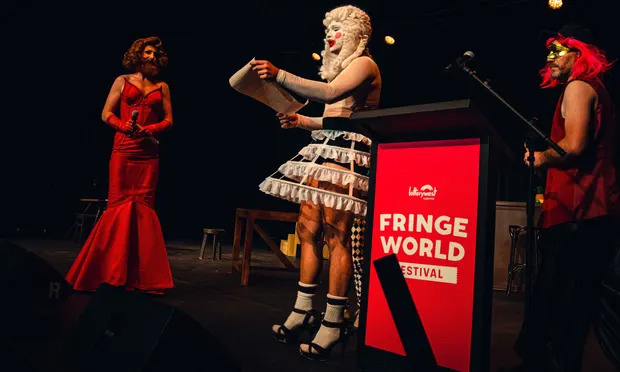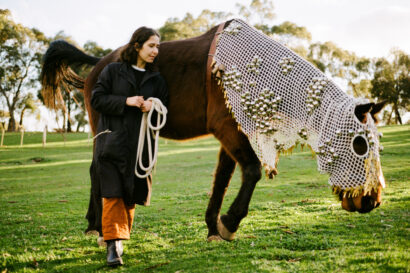The time for arts organisations to divest from fossil fuel funding is now, says artist and activist Noémie Huttner Koros, and there are plenty of ideas about how to make it happen.
From art-washing to climate justice
12 September 2022
- Reading time • 10 minutesMulti-arts
More like this
- Halloween special: How to make blood and other stage tricks
- Seadragon weaves magic spell
- Spring into the school holidays
In ‘Show me the other money’, Seesaw Magazine’s Mark Naglazas investigated alternative funding sources, as pressure mounts for the arts sector to wean itself off mining and fossil fuel dollars.
For artist and activist Noémie Huttner-Koros, it’s vital that we also understand why there is an urgent and irrefutable need for all sectors, industries and communities – including the arts – to rapidly transition away from fossil fuels and works towards solutions grounded in climate justice.
In this response to ‘Show me the other money’, Huttner-Koros talks us through why and how the arts should divest from fossil fuel funding.

Over the last five years or so, it has been heartening to see the arts community locally and nationally begin to have serious discussions about arts funding, art-washing and the social responsibility of artists and arts companies in relation to climate change, fossil fuel companies and climate justice.
These conversations, facilitated by brave artists and activists, have led to tangible outcomes which demonstrate that change is possible and can be achieved through grassroots campaigning, and solidarity with those most marginalised by the climate crisis.
“Art-washing” and the social licence to operate
Fossil fuel companies are reporting record profits globally while Europe swelters and an entire third of the world’s fifth most populous country, Pakistan, is under water. This is the reality of the climate emergency. And fossil fuel companies have been doing this for longer than I have been alive.
At the same time, these companies have also spent millions of dollars denying climate science, funding think-tanks to spread climate misinformation and lobbying politicians to not pass legislation that would address climate change. They have also donated millions to both major political parties. According to Market Forces, in the last financial year alone, fossil fuel companies donated $1,782,619 to the Australian Labor Party, Liberal and National parties, and received $12 billion in tax breaks from the Federal Government.
In WA particularly, there is a revolving door between the gas industry and politicians, as documented in 350 Boorloo Perth’s Captured State report. Over the last thirty years the single biggest obstacle to genuine and long-term climate action has been the influence and actions of the fossil fuel industry.
In her 2019 project, Maps of Gratitude, Cones of Silence and Lumps of Coal, artist and now Mayor of the City of Yarra Gabrielle de Vietri maps the links between the fossil fuels industry and the arts in Australia. It’s a bewildering and overwhelming diagram that highlights how these links exist at all levels between fossil fuels and the arts.
If we want to take action on climate change, we have to challenge the social licence of the fossil fuels industry and the power they exert over all facets of decision-making and our public consciousness. This is where we, as artists, come in.
In her book Arts Wash: Big Oil and the Arts, British writer and Liberate Tate organiser Mel Evans defines artwashing as the process by which fossil fuel companies alter their image from through a public-relations approach facilitated by cultural philanthropy.
Evans explains:
“How is it that there is a gap between all these harmful impacts that oil companies like BP have through their daily activities around the world and our acceptance of them as part of our lives? A big part of what happens in that gap is artwash – the way in which oil companies project a better image of themselves to the public through their associations with cultural institutions and sport and their social licence to operate.” (emphasis added)
If we want to take action on climate change, we have to challenge the social licence of the fossil fuels industry and the power they exert over all facets of decision-making and our public consciousness. This is where we, as artists, come in.
We have both a responsibility, and an opportunity, as artists to significantly alter public perceptions about the fossil fuel industry, to remove their social licence to operate. As Alex Kelly explores in her article in Overland, “there are significant parallels here to the ways in which tobacco advertising was once commonplace and is now seen as unacceptable. Activists, doctors and campaigners worked to ensure stricter controls of tobacco advertising as the public health impacts became clear.”
Kelly continues, quoting de Vietri:
“What about the impact on the arts? It’s not just about money. These associations to people and brands inform the culture of our institutions. From the way the workplace operates to which artists are supported. They can influence who tells a story and influence our shared culture. Are we still willing to accept their money and their governance and in exchange grant them, the fossil fuels industry, their social license to operate?”

A just transition and climate justice
It’s important to also understand global and national trends and campaigns around divestment.
Globally, divestment campaigns have led to approximately $40 trillion divested away from fossil fuels by education institutions, banks, superannuation funds, religious institutions and companies, including the Rockefeller Brothers Fund and Harvard University. Notable divestment campaigns in the arts have led to the Tate Museum, Royal Shakespeare Company, National Theatre in London cutting their ties with fossil fuel companies. This year there has been a campaign for Darwin Festival to divest from its association with Santos and last year youth climate activists from the UK Student Climate Network staged a 24-hour occupation of the Science Museum in London, calling on them to drop Shell as one of its key sponsors.
Divestment is possible and it can be done, we just need the will at all levels of decision-making and to take responsibility for developing our own transition plans and models. We have an opportunity as a sector to plan our own transition, one in which we can live our values in practice, and support communities who are on the frontlines of the climate crisis.
We aren’t doing this alone. Fossil fuel workers and their communities across the country have been planning and campaigning for just transitions for decades, from worker-led movements in the LaTrobe Valley in Victoria, to the campaign for solar thermal in Port Augusta in South Australia.
Here in WA, a report by Clean State outlined 26 big ideas and modelling for 200,000 new jobs as we transition away from fossil fuels.
Here in WA, a report by Clean State outlined 26 big ideas and modelling for 200,000 new jobs as we transition away from fossil fuels. It’s clear that over the coming decades we could see huge investments in renewable energy, mass public transit, affordable housing and environmental restoration. If we start to build relationships with these sectors of the economy now, new collaborations, networks and funding sources will be possible and available.
Building new relationships with those working on a just transition also allows us to move from a scarcity mindset to an abundance mindset. As Annalisa Dias and Ronee Penoi from Groundwater Arts write in the theatre journal Howl Round:
“Instead of operating out of fear about the consequences of divestment (‘What if there’s no other money?’), what if we operated out of wonder at the new possibilities divestment might open up (‘What new relationships might come into my circle once I divest from unjust funds and funding?’)”
Groundwater Arts have developed a clause (through their campaign Divest to Invest) that artists can insert in their contracts to reject funding derived from fossil fuel companies. Part of it reads:
“Client/Employer [should define ‘Client’ and ‘Employer’ in the contract] hereby represents and warrants that: (i) it has not heretofore knowingly and willingly received funds or donation from fossil fuel industries”
As a sector we can start to advocate for similar clauses in agreements developed by peak arts organisations such as NAVA, Theatre Network Australia, APAM and MEAA. As Alex Kelly writes:
“Festivals, arts organisations and artists can actively engage in securing relationships with funders investing in climate action and climate justice whilst simultaneously and publicly withdrawing their support—and their hard-won social capital—from the art-washing initiatives of the extractive capitalist industry.”
Conclusion
Throughout history, we have seen how much of an impact divestment and boycotts can have in shifting public opinion.
Divesting from fossil fuel funding is an opportunity, to radically re-think how and why we do what we do, and embed our values into our processes and structures. Throughout history, we have seen how much of an impact divestment and boycotts can have in shifting public opinion. The organisation Fossil Free lists dismantling the fossil fuel industry’s social license to operate through the work of cultural organisations as one of the campaign’s three key strategies.
There are currently 114 new coal and gas projects proposed for development and construction in Australia. One of these is the Scarborough gas project off the north-west coast of WA developed by Woodside. Any single one of these 114 projects could blow through our carbon budget. There are fears that the Scarborough project will destroy the largest and oldest rock art gallery in the world, containing petroglyphs tens of thousands of years old.
But what happens next can be up to us. As Gabrielle de Vietri so beautifully puts it:
“The social context of our arts must become more authentically connected to our ethics. To the tides of public sentiment. To the urgency of our times. We must interrupt the cultural soliloquy of big business and replace it with the urgent and overwhelming public outcry demanding climate justice.”
Noémie Huttner-Koros is a performance-maker, writer, dramaturg and community organiser based between Whadjuk Noongar boodja and Wurundjeri country in Naarm/Melbourne. Their practice often engages with sites and histories where queer culture, ecological crisis and composting occur. Their work has taken place in theatres, galleries, alleyways, dinner parties and blanket forts. They were the 2021 WA Young Environmentalist of the Year, the 2022 Creative Coordinator of KickstART Festival at Propel Youth Arts WA and are currently studying a Masters of Theatre Dramaturgy.
Read Seesaw Mag’s review of Noemie Huttner-Koros’s 2022 show Mother of Compost.
Pictured top: The Arts & Cultural Workers for Climate Action contingent at Global Strike for Climate 2019. Photo: Courtesy of Noemie Huttner-Koros
Want to find out more, help or donate? Noémie recommends these resources:
Say No To Scarborough Gas
Clean State
350 Boorloo Perth
Seed Indigenous Youth Climate Network
Save our Songlines
Climate Justice Union
Fossil Free Arts NT
Arts & Cultural Workers for ClimateAction: Facebook + Instagram
Like what you're reading? Support Seesaw.






